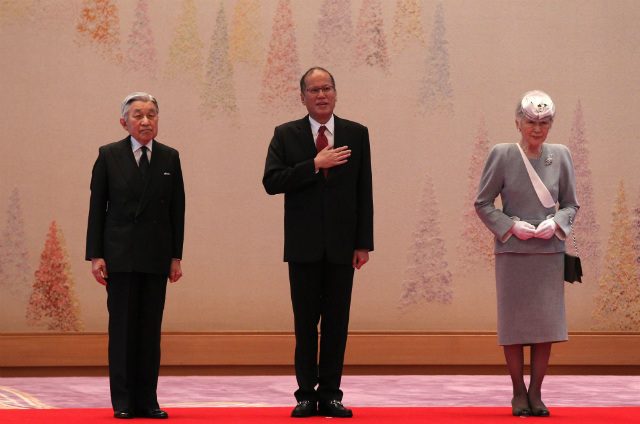SUMMARY
This is AI generated summarization, which may have errors. For context, always refer to the full article.

MANILA, Philippines – President Benigno Aquino III on Wednesday, June 3, said the Philippines will assert itself in the disputed South China Sea (West Philippine Sea) once it fully implements a new but legally questioned military agreement with the United States.
“Once everything has been ironed out – there’s a challenge before the Supreme Court (SC) with regard to this agreement – then perhaps we can also pull our weight and do our share toward enhancing security and stability within the region,” Aquino said in a meeting with reporters during his state visit to Japan.
Aquino was referring to the Enhanced Defense Cooperation Agreement (EDCA) between the Philippines and the US.
Signed on April 28, 2014, the EDCA expands US access to Philippine military facilities. (READ: EDCA: Palawan air base added to locations offered to US)
Experts consider the EDCA a deterrent to China, which is becoming more aggressive in asserting its claim over the South China Sea.
A case against the EDCA before the SC, however, put the defense agreement in limbo. Defense officials preferred to wait for the SC ruling because they don’t want to demolish facilities if the SC rules against the EDCA. (READ: A year later, SC still sitting on EDCA)
US rebalancing ‘sends definite signal’
In his question-and-answer forum with reporters, Aquino also hailed the US’ policy of “rebalancing” to Asia, which means moving more of its naval forces to the Asia-Pacific.
“America’s rebalancing sends a definite signal that we are all supposed to be living other norms that we agreed upon,” the Philippine president said.
Among these norms, he said, is the United Nations Convention on the Law of the Sea (UNCLOS), the so-called Constitution for the Oceans. Both the Philippines and China signed the UNCLOS.
The Philippines cites the UNCLOS in staking its claim over the disputed waters, parts of which Manila calls the West Philippine Sea.
China, on the other hand, stresses its 9-dash line, a demarcation to claim virtually the entire South China Sea. The Philippines says the 9-dash line is baseless under the UNCLOS.
“We have to be scrupulous in adhering to the tenets of international law so that once again we achieve stability, we defuse tensions, and we can concentrate on making our people prosperous,” Aquino said. – Rappler.com
Add a comment
How does this make you feel?
There are no comments yet. Add your comment to start the conversation.